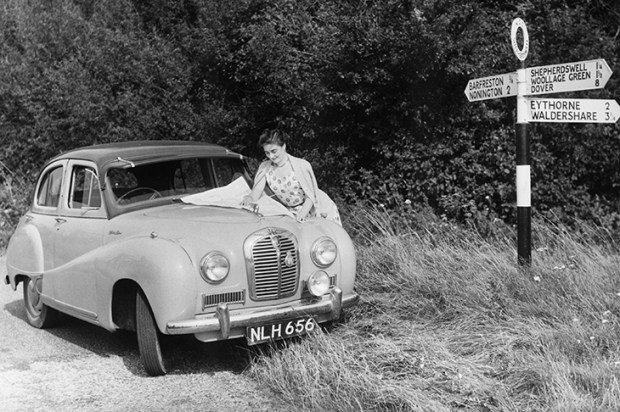Like so many Britons who chased the dream and woke up in Italy I have contemplated writing a book about the Italians. I even thought of what to call it: Those Italians.The title was prompted by what an Albanian port official told the media during some international crisis in response to the news that the entire cargo of an Italian aid ship had disappeared one night in the Albanian port of Durres. ‘Yes it is incredible,’ the official conceded, ‘but — my friends — there is always something funny going on with those Italians.’ An Albanian, of all people!
But such books are a poisoned chalice. The theme demands that you capture the spirit of the place and its people and yet avoid stereotype and cliché. But how do you say anything interesting about the Italians that has not been said so many times before?
If I had not bottled out, my instinct would have been to rattle the cage big time because — here we go — the Italians are a pathologically paranoid people. If a British or American newspaper writes something negative about them, for example, it is front-page news in Italy. It never happens the other way round.
No article I have written anywhere caused as much furore and reader reaction as one a few years ago for the Italian press which attacked a sacred cow: Italian restaurants. I pointed out a simple truth — that Italian restaurant food these days is monotonous and bad. As a result, the Italians simply wanted me out of their country.
The only other article to cause a similar stir was when I pointed out another simple truth: actually, the Allies liberated Italy in the second world war and the partisans were a military irrelevance. Worse, the partisans (dominated by the communists) were anti-democratic, I dared to add, because their aim was to make Italy part of the Soviet bloc. A few days later, I received a bullet in the post, destined for Caterina, the eldest of my five children.
John Hooper — for many years Rome correspondent of the Guardian and Economist — has grabbed the poisoned chalice, and I admire him for that. But he has not rattled the cage. He has decided instead to produce a statistical grand tour alla Guardianista of the past and present of this troubled peninsula which is at the centre of the Mediterranean and therefore at the centre of civilisation as we know it. He writes: ‘What other people of comparable numbers can lay claim to such an extraordinary catalogue of achievements?’
Why? Oh yes, that is the question. Hooper does not answer it. My own view (as a devoted agnostic) is that it was thanks to the Catholic church and the explosive creative power it unleashed artistically and politically. But Hooper does not like the Catholic church and cannot say such things and so moves on to address another issue: how, after the fall of the Roman empire, did Italy remained disunited until the late 19th century? Here he is on safer ground because he can justifiably have a bit of a go at the Catholicism. And thus, with the past boxed off, he moves on to modern Italy: an abominable cesspit mired in top-to-bottom corruption, mafia and red-tape fiscal tyranny, where, as he correctly notes, the truth is merely a matter of opinion — but at the same time blessed with, among other things, seriously beautiful women.
Obviously, on the big issue of three-times prime minister Silvio ‘Bunga Bunga’ Berlusconi, who dominated Italian politics for two decades, he toes the party line — the world liberal left media line — that Berlusconi was beyond the pale. But he does at least have the decency to ask why so many Italians voted for him so often. This forces him to suggest that they were brainwashed, or were themselves equally bad, or else — heaven forbid — that the media-backed judicial assault on Berlusconi was political.
Hooper fudges the answer. Yet even Berlusconi’s one and only conviction (tax evasion) is absurd, and all those millions of Italians know it. At the time of the alleged offence he had no legal role in the company, unlike his son or his right-hand man, who both did and were acquitted of the same offence.
The Robespierrian scapegoating of Berlusconi as the reason for all Italy’s ills tells us much about the dire state of the country’s media and judicial system, which ought to terrify anyone — not just Italians. He did not have blanket media control, as the media insisted. Indeed, the opposite was the case. Nearly all political talk-shows in Italy were, and remain, way to the left of the BBC, like most of its newspapers. As for Italy’s byzantine and ludicrous judicial system, one simply thinks of Amanda Knox — condemned, acquitted, condemned (and the case is still not over).
This book is stuffed with statistics from all manner of international bodies, even on how often Italian women have orgasms.They reminded me of those interminable speeches by Fidel Castro on the Cuban sugar harvest in which he used to reel off figures signifying nothing. More personal anecdotes and observations about his long experience of living in Italy would have been far more valuable; when these do appear they are like manna from heaven.
Something that depresses me about Italy is the slow death of the family since 1945 — and therefore of the nation; a trend which if not reversed will destroy the country. The Italians used to have so many children; now they have hardly any. Hooper does address this issue with his usual statistics but does not enlighten me. My view is that Italian women — more so than women anywhere else in the West — have decided that the only thing that counts in life is having a good time. It is, however, true —as the author notes — that the Italians do wear sunglasses all the time, even at night and in winter and inside church. Ah, those Italians.
Got something to add? Join the discussion and comment below.
Get 10 issues for just $10
Subscribe to The Spectator Australia today for the next 10 magazine issues, plus full online access, for just $10.
Available from the Spectator Bookshop, £16 Tel: 08430 600033
You might disagree with half of it, but you’ll enjoy reading all of it. Try your first month for free, then just $2 a week for the remainder of your first year.














Comments
Don't miss out
Join the conversation with other Spectator Australia readers. Subscribe to leave a comment.
SUBSCRIBEAlready a subscriber? Log in